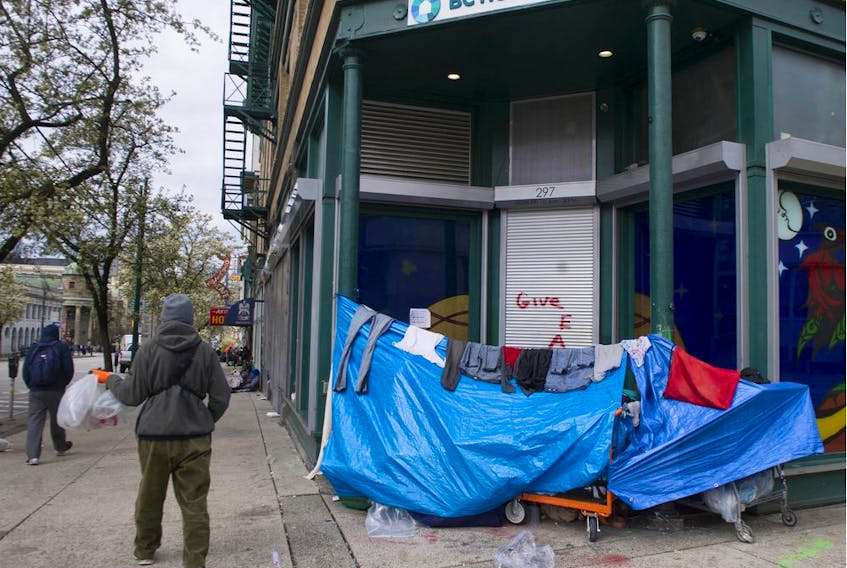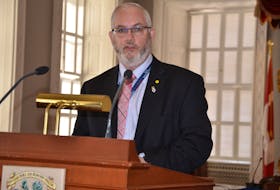Canada is in the midst of two simultaneous public health emergencies — the COVID-19 and drug-overdose epidemics. We are gravely concerned that this has all the makings of a perfect storm that will exacerbate suffering and loss of life if immediate action isn’t taken.
The response to COVID-19 has rightly been rapid, intense and extensive. Tragically, the opposite is true of the continuing opioid crisis, which has already claimed over 14,000 lives in Canada since 2016, with a person dying every two hours. It’s Canada’s forgotten public health emergency.
Already there are troubling signs that Canada’s neglect of the opioid crisis and the new threat of COVID-19 are intersecting. Last week, there was a spike in overdose deaths in Vancouver and, alarmingly, firefighters in B.C. are being ordered not to respond to most overdose calls due to concerns about COVID-19 transmission. These are just the early warning signs of worse to come if public health officials and political leaders don’t take immediate action to respond to the opioid crisis in the context of COVID-19.
A central urgent issue is ensuring that people who use illicit drugs across Canada have access to a “safe supply.” As people who use drugs have reduced access to drugs during COVID-19 and take less, their tolerance will rapidly reduce. The medical research is clear that abstinence (voluntary or not) increases the risk of a fatal overdose when the person uses again. And opioid-use disorder is understood to be a chronic, relapsing condition.
Without providing people who use drugs with a safe supply of drugs of known potency and contents during COVID-19 and beyond, people who use drugs are at increased risk of overdose.
Notably, provinces like Ontario that have shut down all but “essential” businesses during COVID-19 have listed alcohol sales as essential on public health grounds — that some people with alcohol-use disorder who abstain can have medical complications that can be potentially life-threatening.
Likewise, people who use drugs need a safe supply of the substances they use, such as prescription opioids, stimulants and benzodiazepines so they can self-isolate. This would include providing at least two weeks of “carries” for such medications and supplies.
Health Canada recently issued a “class exemption” to Canada’s Controlled Drugs and Substances Act for all physicians and pharmacists in Canada that allows them greater freedom to prescribe and dispense controlled drugs like opioids and stimulants. In B.C., this means that years into the opioid crisis the Ministry of Mental Health and Addictions has finally released new guidelines for physicians to prescribe a “safe supply”, which are legal, prescribed alternatives to the illicit drug supply. It took two public health crises and thousands of deaths to reach this point.
In a further stark contrast, the top-level public health advice for COVID-19 is completely the opposite of what it is for the opioid crisis. To save lives from COVID-19, we’re in the midst of the largest national and global social/physical-distancing exercise in human history with billions of people worldwide under various forms of lockdown. Do not get together with others, shut down places where people meet, isolate yourself if you have symptoms — this is the life-saving advice for COVID-19.
Unfortunately, the best public health advice for responding to the opioid crisis is the precise opposite of that for COVID-19. Since the majority of people who died from opioid-related overdoses die alone, public health officials had been telling people to not use alone but come together in places like supervised consumption sites, and overdose prevention sites — which have recently had their hours curtailed or even shut down due to COVID-19 concerns. This will increase the risk of overdose deaths and innovative solutions are needed.
Even overdose medical treatment must adapt. Overdose response typically means administering naloxone to temporarily reverse the effects of an overdose, and supporting breathing. But since viruses can be transmitted through air droplets, overdose response procedures must evolve as front-line overdose responders adapt to the risks of COVID-19 transmission. They need substantial support to save lives during these twin public health emergencies.
Since an overdose causes respiratory depression, a lack of oxygen to the brain can lead to death or anoxic brain injury — which leads to some overdose survivors being admitted to intensive care units. These are the same critical-care facilities that are needed to help people severely affected by COVID-19.
We must also be incredibly cautious about how restrictions to enforce physical/social distancing disproportionately affect people who are homeless, in precarious housing or otherwise aren’t able to meet those requirements. Instead of threatening to punish them, we need to support them during the COVID-19 pandemic and beyond.
We know what is needed to stem the loss of life during the continuing opioid crisis, yet politicians have been unwilling to act. Countless public health officials tell us we need to provide a safe supply of drugs of known potency and contents to replace the contaminated, poisoned street-drug supply that is killing people. We also need to end the criminalization of people who use drugs and support evidence-based treatment and recovery.
While policy-makers and politicians are correctly seeking to rely on the best available evidence about how to stem the loss of life during COVID-19, we largely continue to see the opposite with the opioid crisis. Elected officials need to follow public health advice during public health emergencies. Otherwise, we are left with a fatal double-standard.
Benjamin Perrin is a law professor at the University of B.C. and author of Overdose: Heartbreak and Hope in Canada’s Opioid Crisis (overdosebook.ca). Jordan Westfall is president of the Canadian Association for Safe Supply.
Copyright Postmedia Network Inc., 2020









